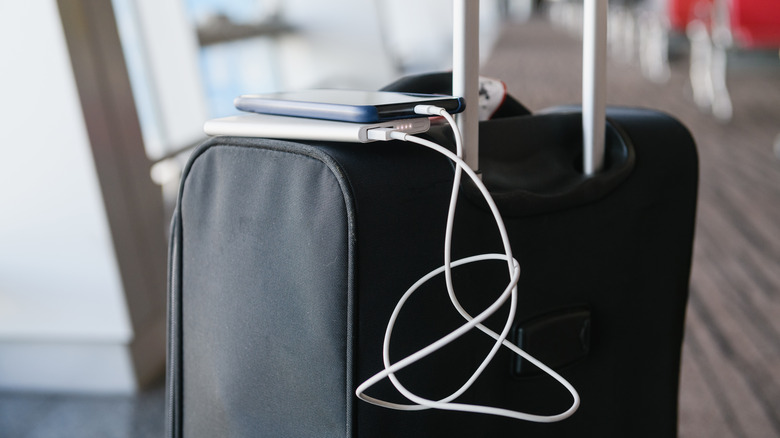What You Need To Know About 'Juice Jacking' Before Your Next Trip To The Airport
While we wish 'juice jacking' was about taking advantage of the complimentary juice bar at your hotel, unfortunately, it's not as fun as it sounds. The F.B.I. has recently issued an advisory to travelers warning them about 'juice jacking,' — a new type of cybercrime that can take place at both domestic and international airports. According to the Federal Communications Commission (F.C.C.), the term refers to the theft of travelers' data via USB ports found at charging stations around the airport.
Unwitting travelers in need of a battery boost may plug their phones or tablets into these chargers and suddenly find their device is attacked by malware that has been installed into these ports. This malware can lock devices or download your personal data (including passwords), essentially giving attackers free-range access to your online accounts. In short, this is basically the equivalent of putting your phone directly into the hands of a criminal. Think how easy it is to reset passwords as long as you have access to your email or texts. When this happens, your bank accounts, social media, photos, and private messages are left vulnerable to attack or could be used against you as blackmail.
Okay, doom and gloom aside. We're not saying never to use airport charging ports again, rather be mindful of the type of phone charger you use. There are ways you can stay juiced up on the go without putting your data and your devices at risk.
Practice safe charging on the go
According to the F.C.C., 'juice jacking' hasn't actually been reported yet. Regardless, it is still a real risk to travelers. There are some very easy steps you can take to kill two birds with one stone — protecting your data and keeping your devices charged. The easiest and most obvious solution is simply to not use USB charging ports and opt for traditional AC power outlets. There is no way for data to be transferred using these types of outlets, so these are always a safe bet. As always, though, it is an airport outlet, so the chances of it actually working or finding one available is kind of a toss-up.
If you can't find an AC power outlet or you don't want to rely on these types of outlets for charging your devices since they can be somewhat infrequent, you can also use a portable charger. These are a great way to ensure you always have power available to charge your most important devices, and you know they are 100% safe since they cannot transfer data.
There are also charge-only cables on the market that do not support data transfer. If you use these, still be cautious. If you plug into a USB port and get a pop-up asking you to share data or to "trust this device," just unplug and find a different port.
Your data has been breached - here's what to do
If a data breach occurs due to accessing a USB port, unplug your phone immediately. If you still have control of your device, make sure to go and change all of your passwords to your most important accounts — email, bank, credit cards, social media, and any other assets that may need protection. If you don't have two-factor authentication already set up on these accounts, this is a good time to do so.
Next, you'll want to go through your phone and delete any apps that you did not download yourself. If you notice charges coming through to your cards and financial accounts, make sure to alert your banks and/or credit card institutions to dispute the charges and freeze your accounts until the issue is resolved.
If your phone has been accessed and you think the hacker still has access to it after disconnecting from the port, your very last resort is to do a full factory reset. This will remove all the files and apps from your phone. While this is not ideal, you'll at least you'll get your phone back, and what information has yet to be accessed will be safe.


